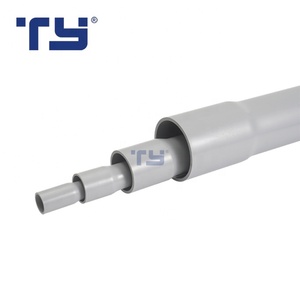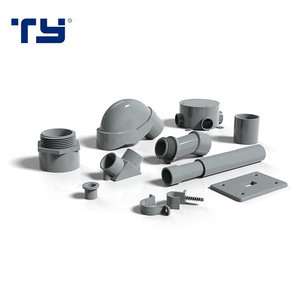(1415 products available)































































































































































































 Ready to Ship
Ready to Ship




























A 1 inch PVC electrical conduit is a type of tubing made from polyvinyl chloride (PVC) material used to protect and route electrical wiring. It is 1 inch in diameter and is commonly used in electrical installations to safeguard wires from damage and provide a safe pathway for electrical current. These conduits are lightweight, cost-effective, and resistant to corrosion, making them easy to install and maintain over time. There are different types of 1-inch PVC electrical conduits, including:
1 Inch PVC Conduit:
It is a plastic pipe used to cover and safeguard electrical wires and cables. This conduit is created from a strong, lightweight plastic called PVC. It comes in different sizes, with 1-inch conduits being among the smaller options. The 1-inch size refers to the diameter of the pipe, meaning it is 1 inch wide on the outside. There are larger sizes, such as 2-inch or 3-inch conduits, which are suitable for bigger wires or specific applications.
Rigid PVC Conduit:
This conduit is made from rigid PVC plastic. It is more robust and less flexible than other types of conduits. Rugged PVC conduits are used in various applications, including electrical wiring for buildings, lighting systems, and other electrical installations.
Non-Rigid PVC Conduit:
Unlike rigid conduits, non-rigid or flexible PVC conduits are thinner and more flexible. These conduits are used in applications where bending or flexibility is needed to route wires around corners or obstacles.
Steel Electrical Conduit:
This conduit is made from steel, a metal that can resist rust and corrosion. It is more robust than PVC conduits and offers better wire protection from impacts, such as compression and explosion. Steel conduits are used in high-strength applications, including industrial settings and areas where wire protection from impact is needed.
Galvanized Steel Conduit:
These conduits are made from steel coated with zinc to stop rust and corrosion. The galvanized steel coating protects the conduits from damage, especially when used outdoors or in wet areas. The coating also gives the conduit a shiny, metallic finish.
Aluminum Electrical Conduit:
These conduits are made from aluminum, a lightweight metal that resists rust. Aluminum conduits are lighter than steel and are often used in applications where weight reduction is essential.
Protection
Conduits protect electrical wires from external damage, impacts, and environmental elements, especially in installations where cables might be crushed, exposed to heat, or in wet conditions. They shield the wires from potential cuts, slashes, and other mechanical harm. This ensures that the wire retains its integrity and minimizes the chance of accidental disconnection or electrical fires due to damaged wiring. PVC's durability eliminates or reduces the chances of wires being damaged by external elements or debris.
Organization
The conduits ensure that electrical systems are organized and neat. This is particularly important in complicated systems with many wires. This organization minimizes the chance of one wire being damaged by another due to overlapping or tight corners. It also makes it easy to identify and trace individual wires, reducing the time needed to do maintenance or repairs. This organization helps in the proper installation of wires, reducing the chances of wiring errors that could lead to electrical fires.
Support
The conduits are used to support electrical wires, ensuring they are installed correctly and securely. This support prevents wires from sagging or becoming loose over time, which can cause wear or damage. PVC's light weight makes it easy to install the conduits in different environments, reducing the need for extra support when installing electrical wires. Proper support from the conduit to the wire ensures there is consistent electrical connectivity, reducing the chances of loose connections.
Insulation
Electrical insulation is important for safety in any electrical system. Fortunately, PVC is a good insulator. Thus, the 1-inch PVC conduit prevents direct contact between electrical wires and any other object or surface. This insulation minimizes the chance of electrical leakage and ensures the safety of any person around the wire. Insulation from the conduit also prevents arcing, which can cause fires. Additionally, the insulation property of PVC minimizes the loss of electrical currents.
Long life
Thanks to the durability of PVC, the conduits have a long lifespan. This makes it a favorite for many people because it is cost-effective. The material used to make the conduits is resistant to rust and corrosion. This is because it is not exposed to moisture. Second, the material is UV resistant, and the conduits can be installed in external environments without worrying about the sun's rays. Finally, the conduit is very durable, and with proper care, it can last for decades.
Residential Wiring:
Conduits are installed in home electrical systems to protect and route wiring for outlets, switches, and appliances. They are installed in basements, attics, and crawl spaces. 1-inch PVC conduits are also installed in the walls to prevent wiring from being damaged by nails or other objects.
Outdoor Lighting:
Outdoor lighting systems for pathways, gardens, and building exteriors utilize PVC conduits to shield electrical wiring from UV radiation, moisture, and mechanical impact. They offer a safe and reliable energy source for outdoor illumination.
Underground Wiring:
In scenarios where electrical cables must be routed underground, such as between a utility pole and a house or in an underground parking lot, PVC conduits are crucial. They protect wires from dirt, moisture, and potential damage during installation or excavation.
Commercial Buildings:
Conduits are commonly used in commercial construction projects to safeguard and organise electrical wiring systems. Their smooth interior surface allows for easy cable pulling, making them ideal for extensive and complicated wiring networks like those found in office space, retail stores, and hospitals.
Industrial Settings:
In industrial plants, such as factories, refineries, and manufacturing facilities, PVC conduits protect and organise electrical wiring for machinery, equipment, and power distribution. They are especially useful in guarding wires against mechanical stress, chemicals, and harsh environments.
Data Centers and IT Rooms:
PVC conduits are integral to organising and protecting the extensive wiring in data centres and IT server rooms. They ensure the safe transmission of power and data to computer servers, networking equipment, and other electronic systems, preventing overheating and interference.
Healthcare Facilities:
Hospitals, clinics, and healthcare centres rely on PVC conduits to protect critical electrical wiring for medical equipment, lighting, and power supply in patient rooms, operating theatres, and emergency areas. Their reliability is essential for maintaining patient care and safety.
Telecommunications:
PVC conduits are widely used to protect and route telecommunications cabling, such as telephone lines, internet, and cable TV connections. They ensure the uninterrupted transmission of voice, data, and video signals in residential, commercial, and industrial settings.
Choosing the right PVC electrical conduit for a project requires careful consideration of several factors to ensure it meets the specific electrical and environmental requirements. Here are some key factors to take into account when purchasing:
Size and Capacity
Determine the correct size of the 1 inch pvc electrical conduit needed to accommodate the cables or wires. Consider the fill capacity required to prevent overheating and consult industry standards for guidance.
Type and Material
Identify the type of PVC conduit suitable for the project, such as rigid or flexible conduits. Rigid conduits are preferred for straight runs, while flexible conduits are used in areas that require bending. Consider material factors like durability, corrosion resistance, and temperature rating of each project location.
Compliance and Standards
Ensure the PVC electrical conduits comply with local building codes and industry standards. This may involve consulting with electrical engineers or reviewing regulations to determine the required specifications.
Installation Requirements
Consider the installation method, such as whether the conduits will be installed in walls, ceilings, or underground. This will influence the type of conduits required. Also, think about the labor and tools needed for the installation process. Some conduits may require specialized tools or techniques, which can impact costs and timelines.
Price and Budget
Compare prices of different PVC electrical conduits while considering their quality and performance. Sometimes cheaper options may lead to higher costs in the long run due to durability or compliance issues. Ensure the selected conduit fits within the project budget without compromising safety and quality standards.
Availability
Check the availability of the selected PVC electrical conduits from local suppliers or online sources. This can help avoid delays in the project timeline. Also, consider the delivery time if ordering conduits from a distant location, especially for projects with tight deadlines.
Q: Why use PVC electrical conduit?
A: PVC is light and easy to handle. It does not rust or corrode, which makes it good for protection wires in different weather conditions. PVC is also cheaper than other materials like metal.
Q: What does a conduit of 1 inch mean?
A: It means the diameter of the pipe is 1 inch. This size is good for carrying several electrical wires in one pipe. The 1-inch conduit gives wires space and airflow.
Q: What are the types of electrical conduits?
A: The main types are metal and PVC. PVC conduits are lighter and do not rust. There are different sizes of metal and PVC conduits, like 1-inch and 2-inch. They come in pipes and flex cables.
Q: What type of PVC conduit is used for electrical wiring?
A: Rigid PVC conduit is used for electrical wiring. It comes in straight pipes that do not bend easily. RMC, GRC, and IMC are types of rigid metal conduits. They are strong and provide good protection for wires.
Q: What type of conduit is best for wiring?
A: Rigid conduits are best for wiring because they provide good protection. PVC and metal rigid conduits are safe for carrying electrical wires in homes and buildings.